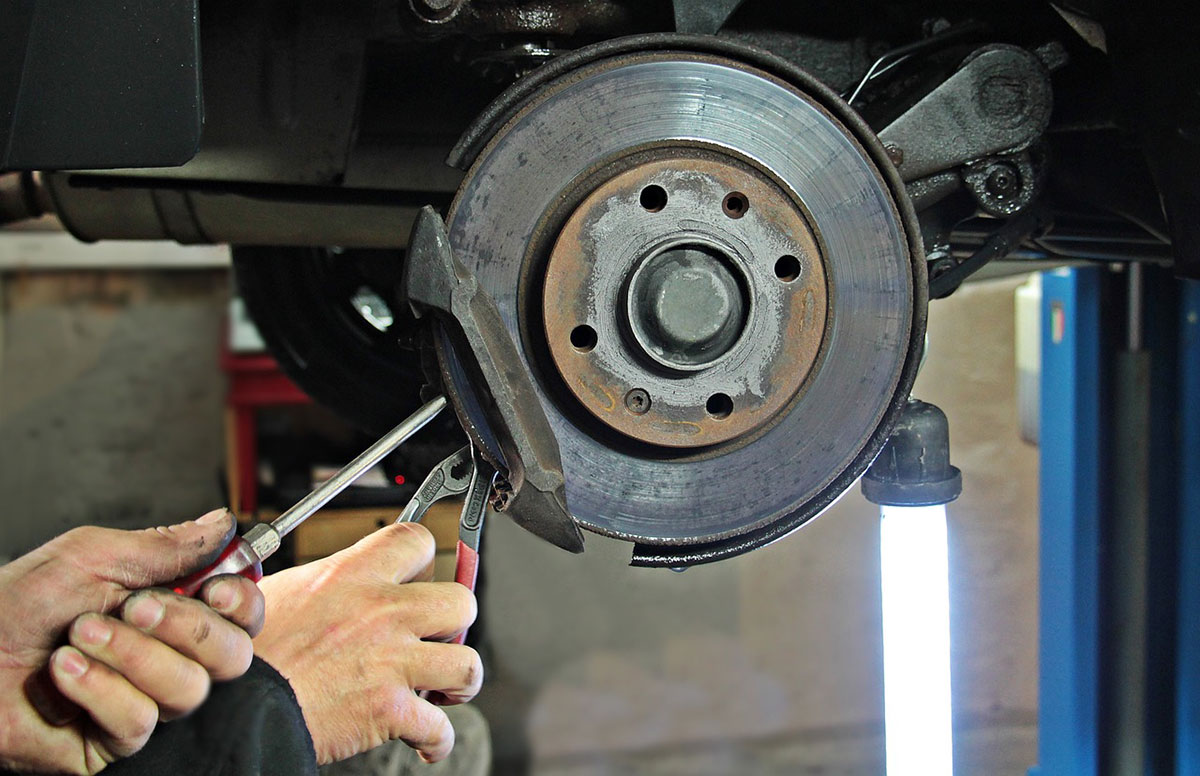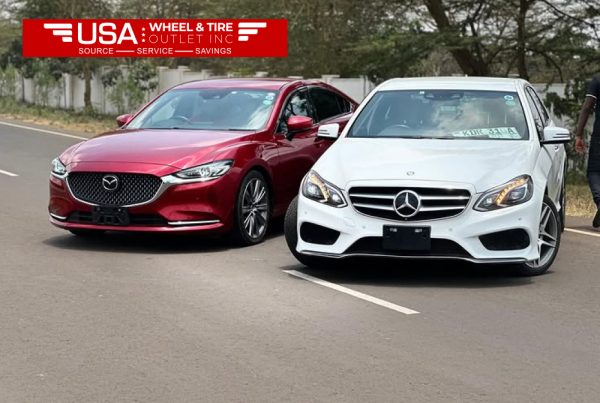Have you ever noticed that your wheels shake during braking? This is a frequent issue many drivers face as well as at times uncomfortable and even disturbing. What’s the reason behind this odd phenomenon? Knowing the cause the reason your wheels shake when you brake is crucial to maintain the safety of your vehicle and its performance.
We’ll examine the most frequent causes of the vibration of a wheel when you brake such as brake problems, warped rotors as well as wheel alignment issues. We’ll also look at ways to identify and fix the issues and ensure that your vehicle is in top condition.
Common Causes of Wheels Shaking When Braking
There are a variety of factors that could contribute to the shake or vibration that you feel when you push your brake. Certain of these causes are simple to spot however others might require some more research. The most frequently reported issues:
1. Warped Rotors
One of the most common reasons for wheel shake during stopping is the rotors that are warped. A brake rotor a part of your vehicle that the brake pads are fixed to stop or slow the wheels. As time passes, rotors may be irregular and “warped” due to excessive heat and wear. If rotors aren’t even and the brake pads are not even, they do not meet in a uniform way with the rotor. This causes vibrations to travel through the wheels.
How to Identify Warped Rotors
If you observe these signs the rotors may be stretched. It is essential to have them checked by a certified mechanic. In certain instances they may be replaced however, when the damage is too serious, you’ll have replacement.
2. Brake Pads Wear
Wear-out brake pads can make your vehicle’s wheels shake while you brake. Brake pads press against rotating rotor to create friction, which slows the vehicle down. If the brake pads are excessively thin, they may result in uneven braking pressure that can result in bumpy and noisy sensations while you brake.
Signs of Worn Brake Pads:
If you spot any of these symptoms it is crucial to get replacement of your brake pad as quickly as you can. In the event of a problem, worn-out brake pads could cause damage to brake rotors, which can lead to expensive repairs.
3. Wheel Alignment Problems
Problems with wheel alignment could also trigger shaking when you brake. If your wheels aren’t in alignment, they won’t be pointed in the right direction. This can cause your car to pull to one side or trigger vibrations, particularly when you brake.
It can happen due to many reasons, such as the impact of potholes or curbs in general wear to your suspension. If the wheels on your car aren’t properly aligned the brake system needs to work harder and you may experience shakes or vibrations when you stop.
How to Tell if Your Wheels Are Misaligned:
If you experience any of these signs It is recommended to have an alignment of your wheels performed by a skilled mechanic. This simple adjustment can fix the issue and help prevent any further damage to your tires or suspension.
4. Uneven Tire Wear
Uneven wear on your tires can result in your tires shaking during you brake. If the tread on your tires are not worn evenly, this may cause an imbalance that results in vibrations when the tire is in contact with road. This problem is most apparent when you brake, because the tire’s pressure alters.
Common Causes of Uneven Tire Wear:
It’s essential to periodically test your tire pressure and check your tires for indications of wear uneven. If needed, change your tires and have an aligning of your wheels to prevent any issues from occurring.
5. Suspension System Issues
Your suspension of your car is responsible to absorb shocks and keep your vehicle in a stable position when driving. If you have a problem with your suspension, like damaged struts or worn-out shocks this can result in irregular braking, which can cause your wheels to shake. A damaged suspension system could influence how your car performs overall.
Signs of Suspension Problems:
If you think that your suspension may be the reason for the vibrations, make sure to have it examined by a mechanic as soon as you can. The early detection of issues with your suspension will help prevent further damages to the vehicle.
6. Brake Caliper Problems
It is the brake caliper is responsible for pushing on the rotor’s brake pads. If the caliper gets stuck or isn’t functioning correctly, it could create an uneven pressurization on the brake rotor creating vibration or shaking when you brake. This could result in the car to move toward one side during stopping.
Signs of Caliper Issues:
A brake caliper that is damaged requires immediate attention. If it is not addressed it may cause damage to rotors as well as other components of the brake.
7. Brake Fluid Contamination
The contamination of the brake fluid can impact the efficiency of your brake system, possibly causing shakes when braking. In the event that your brake fluid has been polluted by air, moisture or dust, this could result in the system’s brakes to be less responsive, resulting in the occurrence of pulsations or vibrations.
How to Prevent Brake Fluid Contamination:
How to Fix the Problem
The causes of shaking a variety of possibilities for solutions:
8. Brake Rotor Thickness Variation (RTV)
Another cause that is often ignored in shaking during brakes are rotor thickness variations (RTV). It refers to small differences between the thicknesses of brake rotors because of the wear and tear. As time passes, rotors may be thinner due to a lot of braking heat or improper contact between pads. As pads of the brake press down, any irregularities with rotor thickness could cause vibrations or pulsations.
How RTV Affects Your Brakes:
Rotors that are affected by RTV may be repaired by a professional. However, in the most extreme instances, replacement may be required. If you’ve noticed shaking while braking, getting the rotor’s thickness measured can aid in identifying the issue.
9. Improperly Balanced Tires
Balanced tires makes sure that your tire’s load are evenly distributed across the wheel. If your tires aren’t properly balanced, they can result in uneven rotation and cause shaking when braking or at speeds that are high. If the tires on your vehicle are not balanced this could cause shaking that is more apparent when you apply the brakes, particularly when you are driving at higher speeds or in difficult stops.
Signs of Imbalanced Tires:
The issue of balancing your tires is usually addressed by a visit to an expert in tire repair. They’ll use special equipment to balance your tires, which will ensure a more comfortable ride, and also preventing wear on your brakes as well as suspension system.
10. Loose or Worn Suspension Components
The suspension system is a key element in ensuring stability of the vehicle especially when brakes. If components such as ball joints, tie rods and bushings are damaged or loose and loose, the vehicle's handling could be compromised, leading to shakes or vibrations during brakes. The worn parts may also impact the wheel alignment which can cause more braking problems.
How Loose Suspension Components Cause Shaking:
If you suspect that your suspension is worn components, you must inspect them and replace them. In the absence of doing this, it could result in more serious injuries and possibly unsafe driving conditions.
11. Brake System Contamination or Air in the Lines
The brake system is prone to contamination including dust, moisture, or air bubbles in brake lines, may greatly affect the performance of braking. The air in the lines of brakes can result in a varying brake force, which could result in pulsations or vibrations when the braking. Additionally, moisture or dirt could cause corrosion, thereby reducing the effectiveness of brakes.
Causes of Brake Line Contamination:
To prevent this from happening It is essential to periodically check the brake fluid and then replace it in accordance with the recommendations of the manufacturer. If there is air in the lines of brakes is found to be a problem then a flush of the brake fluid and an expert bleeding of the system can ensure proper functioning.
12. Impact of Driving Style on Brake Wear
Your behaviours could also be a major factor in shaking your wheels when you brake. Driving with a lot of force, like the hard brakes, rapid acceleration and frequent stopping and starting, put an enormous strain upon the brake mechanism as well as other parts. In time, this could result in warping of brake pads, uneven wear and host of other problems which can cause shaking when applying the brakes.
How Driving Style Contributes to Shaking:
If you drive recklessly, think about adopting more smooth ways of driving. This will help prolong the lifespan of the tires, brakes and suspension parts, while preventing shaking and other issues.
Conclusion
If your vehicle's wheels shake while stopping, it is crucial to resolve the root of the problem in the earliest time possible. If it's brake problems, warped rotors, wheel alignment issues or any other issue that could cause problems, they can affect the safety of your vehicle and its performance.
Regular maintenance and a prompt detection can help prevent further damage and ensure your vehicle is operating smoothly. Always seek out an expert mechanic if you're uncertain about the source of the shaking. They will be able to identify the issue and provide the correct solution.
Do not ignore the sound during braking. It could be the car telling you something isn't working properly. Make the fix early in order so that your car is secure and comfortable. It's also in top condition.
FAQs on Why Do Wheels Shake When Braking
1. What causes my wheels to shake when I brake?
Wheels might shake while brakes are applied due to a variety of reasons, such as broken rotors, worn brake pads and wheel alignment issues or uneven wear on the tires. These issues can affect the smooth interactions between component of your brakes and roads, which can cause vibrations when you press the brakes.
2. How do warped rotors can cause shaking while brakes are applied?
The rotors of warped rotors may cause shaking as they are uneven, which prevents brake pads from making a consistent contact with the rotor's surface. This causes pulsations or vibrations that can be felt on the steering wheel as well as the entire vehicle if you brake. Rotors that are overheated or worn unevenly due to abrasive braking are the most common reasons for warping.
3. Are worn brake pads causing shake in the wheel?
Yes wear and tear on brake pads can make your wheel shake. If the pads for your brakes aren't thick enough they might apply in a different way on the rotors, which can lead to vibrations. In certain cases the worn pads may create grooves and scoring on the rotors that causes more shaking.
4. What are the causes of wheel alignment issues? Influence brakes?
If the wheels of your car are not aligned properly they will not point in the correct direction. The misalignment can cause an uneven pressure on the brakes and could cause your car to slide towards one side or create shaking when you stop. Problems with alignment of wheels can result in premature tire wear, which can worsen the shaking as time passes.
5. Does tire alignment cause shaking while you brake?
Yes it is true that an uneven tire could cause shaking while stopping. In the event that your tires' weight distribution is unbalanced and causes vibrations, it can cause them particularly during the braking process or when driving at high speeds. Regularly balancing your tires can help prevent this problem.
6. What other suspension issues can cause wheel shake?
Suspension problems, for example worn-out struts and shocks or other suspension components such as ball joints or tie rods are a cause of vibrations during braking. An unsound suspension impacts the stability of the vehicle, leading to shake and braking that is uneven.
7. What can I do to tell whether my rotors are bent?
If the rotors on your car are warped and you feel an vibration or shaky sensation on your steering wheel, or pedal when you press the brakes. There may be other unusual sounds like grinding or squealing. You may also you may notice grooves appearing on the surface of the rotor. A mechanic can inspect the rotors' surface for warping and suggest whether they should be repaired or replaced.
8. Is the driving style a factor in the shaking of the wheels?
Yes, aggressive driving practices such as heavy brakes as well as speedy acceleration can place additional strain upon the brake mechanism, and result in excess wear to the brake rotors pads and tires. This can result in the rotors becoming warped and uneven wear on tires as well as other issues that lead to wheels to shake during braking.





